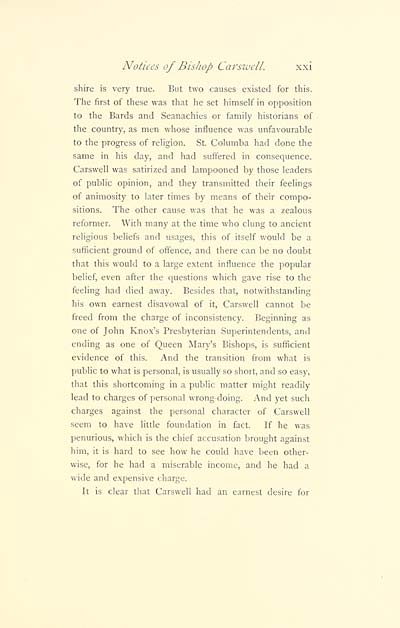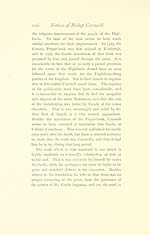Download files
Complete book:
Individual page:
Thumbnail gallery: Grid view | List view

Notices of Bishop Carswell. xxi
shire is very true. But two causes existed for this.
The first of these was that he set himself in opposition
to the Bards and Seanachies or family historians of
the country, as men whose influence was unfavourable
to the progress of religion. St. Columba had done the
same in his day, and had suffered in consequence.
Carswell was satirized and lampooned by those leaders
of public opinion, and they transmitted their feelings
of animosity to later times by means of their compo-
sitions. The other cause was that he was a zealous
reformer. With many at the time who clung to ancient
religious beliefs and usages, this of itself would be a
sufficient ground of offence, and there can be no doubt
that this would to a large extent influence the popular
belief, even after the questions which gave rise to the
feeling had died away. Besides that, notwithstanding
his own earnest disavowal of it, Carswell cannot be
freed from the charge of inconsistency. Beginning as
one of John Knox's Presbyterian Superintendents, and
ending as one of Queen Mary's Bishops, is sufficient
evidence of this. And the transition from what is
public to what is personal, is usually so short, and so easy,
that this shortcoming in a public matter might readily
lead to charges of personal wrong-doing. And yet such
charges against the personal character of Carswell
seem to have little foundation in fact. If he was
penurious, which is the chief accusation brought against
him, it is hard to see how he could have been other-
wise, for he had a miserable income, and he had a
wide and expensive charge.
It is clear that Carswell had an earnest desire for
shire is very true. But two causes existed for this.
The first of these was that he set himself in opposition
to the Bards and Seanachies or family historians of
the country, as men whose influence was unfavourable
to the progress of religion. St. Columba had done the
same in his day, and had suffered in consequence.
Carswell was satirized and lampooned by those leaders
of public opinion, and they transmitted their feelings
of animosity to later times by means of their compo-
sitions. The other cause was that he was a zealous
reformer. With many at the time who clung to ancient
religious beliefs and usages, this of itself would be a
sufficient ground of offence, and there can be no doubt
that this would to a large extent influence the popular
belief, even after the questions which gave rise to the
feeling had died away. Besides that, notwithstanding
his own earnest disavowal of it, Carswell cannot be
freed from the charge of inconsistency. Beginning as
one of John Knox's Presbyterian Superintendents, and
ending as one of Queen Mary's Bishops, is sufficient
evidence of this. And the transition from what is
public to what is personal, is usually so short, and so easy,
that this shortcoming in a public matter might readily
lead to charges of personal wrong-doing. And yet such
charges against the personal character of Carswell
seem to have little foundation in fact. If he was
penurious, which is the chief accusation brought against
him, it is hard to see how he could have been other-
wise, for he had a miserable income, and he had a
wide and expensive charge.
It is clear that Carswell had an earnest desire for
Set display mode to: Large image | Transcription
Images and transcriptions on this page, including medium image downloads, may be used under the Creative Commons Attribution 4.0 International Licence unless otherwise stated. ![]()
| Early Gaelic Book Collections > Blair Collection > Book of Common Order, commonly called John Knox's Liturgy > (25) |
|---|
| Permanent URL | https://digital.nls.uk/76253093 |
|---|
| Description | A selection of books from a collection of more than 500 titles, mostly on religious and literary topics. Also includes some material dealing with other Celtic languages and societies. Collection created towards the end of the 19th century by Lady Evelyn Stewart Murray. |
|---|
| Description | Selected items from five 'Special and Named Printed Collections'. Includes books in Gaelic and other Celtic languages, works about the Gaels, their languages, literature, culture and history. |
|---|

